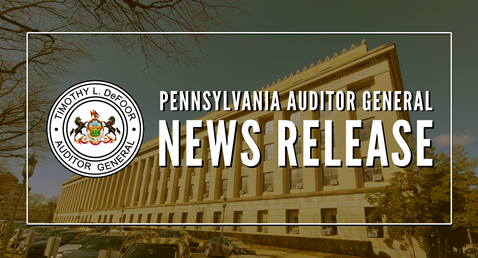Auditor General DePasquale Says Audit of Rochester Area School District Finds Troublesome Conflict of Interest
Superintendent Severance Agreement Cost Taxpayers More Than $146,000
Auditor General DePasquale Says Audit of Rochester Area School District Finds Troublesome Conflict of Interest
Superintendent Severance Agreement Cost Taxpayers More Than $146,000
HARRISBURG (Dec. 18, 2013) – Auditor General Eugene DePasquale today said a recent audit of the Rochester Area School District, Beaver County, identified violations of the school code, a possible conflict of interest involving a former school board member, and a severance agreement with a former superintendent that cost taxpayers more than $146,000.
“Taxpayers expect their elected school board members will ensure funds are properly expended and that business dealings are beyond reproach,” DePasquale said. “Unfortunately, in the case of a former superintendent’s severance payment and the involvement of a former board member approving payments to his construction firm, Rochester Area School District failed the taxpayers.”
Auditors found that because an employment contract with a former superintendent did not contain adequate termination provisions, the district in 2012 spent $146,328 in legal fees, wage and benefit payments to try to remove the former superintendent from office.
“Better management and oversight from the school board could have prevented the district from wasting this money in an effort to remove a superintendent,” DePasquale said. “These are funds that should have been put to use in the classroom for the education of the Rochester area’s children.”
DePasquale said auditors also found a possible conflict of interest issue and school code violations surrounding a former school board member’s business interests with the district. In April 2009, the school board awarded a $354,636 indoor swimming pool renovation contract. Majority ownership of the contracting company was held by an individual who would become a member of the district’s school board three weeks later.
While a member of the school board, including time as board treasurer, the contracting company owner approved payment of bills to his own company. The board member also approved a change order to the original contract for his company.
In addition to the possible conflict of interest issues, the former board member failed to file – both as a school board candidate and member of the school board – a statement of financial interests with the district as required by the state Ethics Act. The act specifically requires public officials to disclose matters that currently or potentially create conflicts of interest with their public duties.
“Once again, if the district had better management and oversight, this problem could have been averted,” DePasquale said. “However, the blame on this should also be shouldered by the former board member who should have known that it is not only improper but a violation of the Public School Code to vote on issues that direct taxpayer dollars to your personal business.”
To prevent recurring problems with superintendent contracts, potential conflicts of interest or ethics violations, auditors recommend that the district:
- ensure that all future employment contracts with prospective administrators contain adequate termination procedures to protect the interests of the district and taxpayers;
- document in the official board meeting minutes, in detail, why the district chooses to expend large amounts of public taxpayer money to end an administrator’s contract;
- implement procedures to ensure that board members’ actions are in compliance with the school code, the Ethics Act, and the district’s board policy;
- establish procedures to ensure that the district properly scrutinizes all contracts to ensure that it is aware of any potential conflicts of interest; and
- implement necessary procedures to ensure that financial interest statements are received on a timely basis and are properly completed to ensure full disclosure.
Management of the Rochester Area School District waived the opportunity to respond to the audit.
In the 2009-10 school year, the Rochester Area School District provided basic education to 859 students and served a population of 7,046. The district employed 79 teachers, 63 full- and part-time support staff, and 6 administrators. The district received $8.2 million in state funding in the 2009-10 school year.
The Department of the Auditor General’s Bureau of School Audits examines the records of school districts, charter schools, intermediate units, and area vocational-technical schools. The audits — among other things — assess whether or not school entities received the state subsidies and reimbursements to which they were entitled, accurately managed taxpayer funds, and complied with ethics codes. The audits also determine whether or not teachers and administrators were properly certified for the positions they held during the audit period.
The Rochester Area School District audit is available online at: www.PaAuditor.gov/audit-reports
###
Return to search results